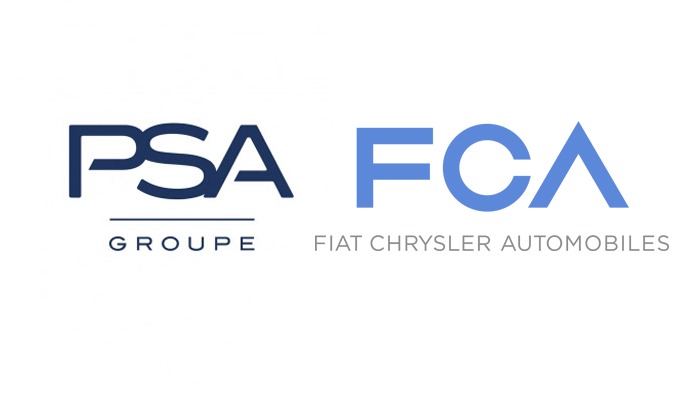FCA and PSA Group confirm merger as Europe’s second-biggest automotive company
31 October 2019

31 October 2019
PSA Group and Fiat Chrysler Automobiles (FCA) are to merge, creating Europe’s second-largest automotive manufacturing entity.
Subject to completion, the new business will see both carmakers hold an equal share and create a company that year-to-date is only 205,000 vehicle sales short of toppling Volkswagen Group’s dominance of the EU market. It will have combined revenues of nearly €170 billion and recurring operating profit of over €11 billion globally on a simple aggregated basis of 2018 results, making it the fourth-largest carmaker in the global market.
The merger significantly strengthens both outfits in terms of strategy. PSA Group will have an open door to the US market through FCA’s Jeep and Chrysler brands, while the Italian company has access to new-electrified vehicle (EV) platforms, an area in which it is lagging behind rivals, highlighted by its purchase of Tesla’s emission credits to meet EU CO2 targets.
The new group will comprise of PSA brands Peugeot, Citroen, Opel, Vauxhall and DS Automobiles, and FCA marques Fiat, Chrysler, Jeep, Alfa Romeo, Maserati, Dodge, RAM, SRT and Mopar
Management line
The Board of the new business would be composed of 11 members. FCA will nominate five board members, including John Elkann as chairman, while five would be nominated by PSA Group, including the senior independent director and the vice-chairman. The chief executive officer will be Carlos Tavares of PSA for an initial term of five years, and he will take a seat on the board, the carmakers announced in a joint statement.
′[This move] follows intensive discussions between the senior management of the two companies. Both share the conviction that there is compelling logic for a bold and decisive move that would create an industry leader with the scale, capabilities and resources to capture the opportunities successfully and effectively manage the challenges of the new era in mobility,’ the release adds.
′This convergence brings significant value to all the stakeholders and opens a bright future for the combined entity,’ stated Tavares. ′I’m pleased with the work already done with Mike [Manley, FCA CEO] and will be very happy to work with him to build a great company together.’
Affected parties
The merger will be a blow to Renault, which had been hoping to revive merger talks with FCA once it had stabilised its relationship with alliance partner Nissan. The French company now falls further behind its domestic rival at a time when the industry is reaping the financial and technological advantages of collaboration.
It is unknown how the new deal will affect plants, and whether there will be an impact on jobs. FCA is likely to want to keep its Italian plants, while as a shareholder, the French Government can state that it needs to protect the domestic market.
This has led to concerns from UK workers at Vauxhall’s plant in Ellesmere Port. PSA Group, which bought the carmaker and its European arm Opel in 2017, has been vocal about the impact that Brexit could have on the factory, which currently produces the Astra model. Tavares stated that while the next-generation Astra is likely to be built there, continued uncertainty around the UK leaving the EU may mean it changes its mind.
′Merger talks combined with Brexit uncertainty is deeply unsettling for Vauxhall’s UK workforce which is one of the most efficient in Europe,’ Unite national officer Des Quinn told the BBC.
′The fact remains, merger or not; if PSA wants to use a great British brand like Vauxhall to sell cars and vans in the UK, then it has to make them here in the UK.’